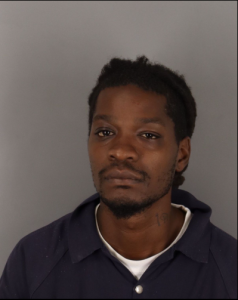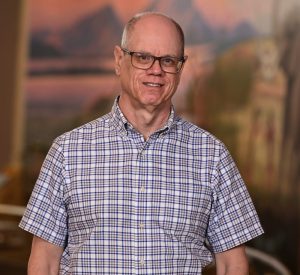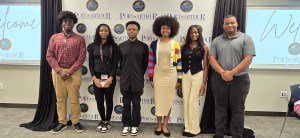Port Arthur tennis champ draws clear line between athleticism and neurological disorder
Published 12:38 am Tuesday, April 18, 2023

- Bob Hope senior Nicole Hernandez recently earned state singles champion for tennis in the Texas Christian Athletic League State Championship. (Monique Batson/The News)
|
Getting your Trinity Audio player ready...
|
Nicole Hernandez is a state champion in tennis.
Hernandez also has multiple sclerosis.
But she wants others to know that one has nothing to do with the other.
Trending
“I won because I was a great athlete,” said the senior at Bob Hope High School. “I worked hard and was dedicated to winning, not because I overcame something. That is a whole different part of my life.”
Earlier this month Hernandez and the Bob Hope Eagles tennis team competed in the Texas Christian Athletic League State Championship.
Hernandez earned state singles champion, and the team earned an overall runner-up finish.
Prior to four yeas ago, tennis state champion wasn’t a title Hernandez expected to earn. She had never played before her freshman year.
“I heard there were tryouts and decided to play to see if I liked it,” she said. “I did.”
The Port Arthur resident has been active all her life, spending seven years with the Gulf Coast Youth Soccer Club and also playing volleyball.
Trending
And while she doesn’t plan on playing in college, she hopes to continue tennis recreationally.
“I did it enjoy it a lot,” Hernandez said. “I met people that were equally as interested and dedicated to do better, so hopefully in the future we can still meet up and keep playing.”

Nicole Hernandez is pictured with her doubles partner, Ammiel Ordaz, with whom she trained. (Courtesy photo)
Following upcoming graduation, she will attend a community college in Houston, where she plans to study film.
“I love making movies,” Hernandez said. “I love thinking of movies I’m going to make. My dad would always film us when we were little. After a while I started watching them and realized that cameras, taking videos and recording everything really interested me. And I’ve always had a big imagination.”
Documentaries are her favorite.
“I like that they are able to have their voice heard,” she said. “I want to be able help give other people voice that they can’t find anywhere else, and help share their story in the way they want it to be spread.”
It’s particularly important to the teen who wants ownership of her own narrative.
“Life throws things unexpectedly at you,” Hernandez said. “It’s the way you decide to pick yourself up and keep going is what determines how your future will turn out. The main thing is don’t give up. My story isn’t more special than anyone else. I’m just like everyone else. There are just certain things that make me different.”
Diagnosis
Hernandez woke up on Mother’s Day 2022 only to realize the left side of her body was numb.
“I had trouble walking,” she said. “My balance was really bad. I was at work and I’d have to grab something and it was really hard. I couldn’t close my hand really well. And my thoughts weren’t as coherent.”
A few days later she visited a local hospital, where she was referred to her primary care physician. From there she was sent to a neurologist at The University of Texas medical Branch in Galveston.
She was admitted, as she was exhibiting signs of a stroke.
An MRI led to a diagnosis in August 2022.
“It wasn’t how I expected to react,” Hernandez said of hearing the news. “I couldn’t process it. I don’t think I still have processed it completely.”
According to the National Institute of Neurological Disorders and Stroke, MS is the “most common disabling neurological disease” for those ages 20-40.
“A small number of people with MS will have a mild course with little to no disability, whereas others will have a steadily worsening disease that leads to increased disability over time,” the agency says. “Most people with MS, however, will have short periods of symptoms followed by long stretches of relative quiescence (inactivity or dormancy), with partial or full recovery. The disease is rarely fatal and most people with MS have a normal life expectancy.”
For Hernandez, MS means just being aware of any new symptoms and reporting them to her doctor. In addition, she has had to make some adjustments, such as limiting time in the heat.
And it never stopped her tennis game.
“Thankfully I never experienced complications that made me have to stop,” she said. “I just had to accommodate to it. I brought a little fan. And every time we finished a point, I’d make sure to keep cool. If I needed a break, I’d take a break.”
For now she’s focused on completing high school, starting college, staying athletic and spending time with family and friends.
“Every once in a while, I fear waking up and being paralyzed, not being able to move, not being able to do the things I love,” Hernandez said. “But in general, I don’t try to kill myself with the ‘what ifs.’ I just focus on the good things instead of the bad things that could happen.”







